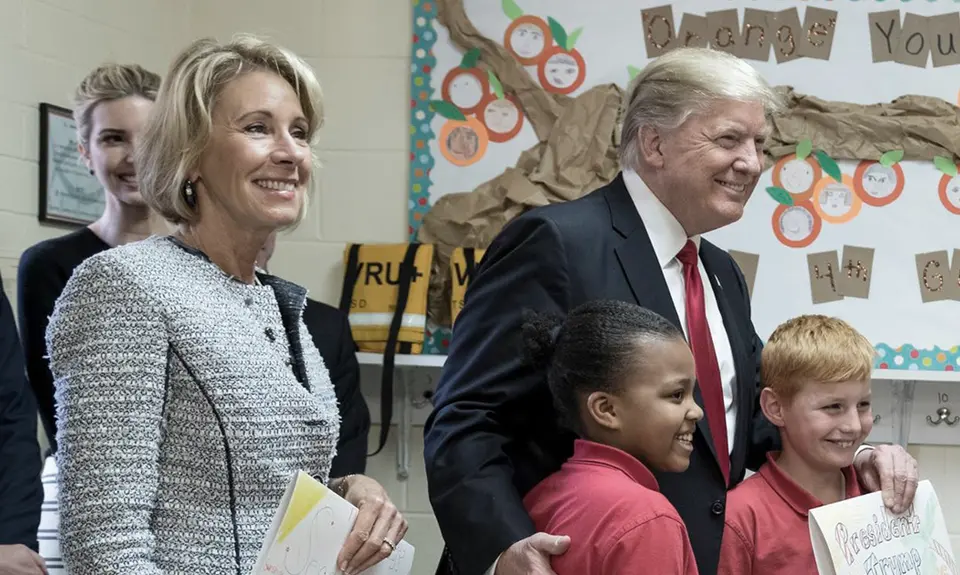When Congress narrowly averted a government shutdown last spring, one of the most disappointing outcomes of the deal was the reauthorization of the D.C. private school voucher program. Studies have consistently shown that these vouchers, which Congress forced on D.C. in 2003, have not improved educational outcomes and suffer from program management and accountability failures. Now that the Department of Education, led by pro-voucher zealot Betsy DeVos, is considering changes to its D.C. voucher data collection, we need to ensure that they build on previous studies and evaluate the program in a sound and thorough manner using the strongest possible research design—and that they don’t jettison accountability in favor of the Trump-DeVos education agenda. People For the American Way joined January 26 comments sent to the Department by the National Coalition for Public Education. An excerpt from those comments follows below. Click here to download a PDF copy of the full comments.
The Data Collection Should Include Information Regarding Student Access to the Voucher Program.
Private schools participating in the D.C. voucher program may maintain selective enrollment policies and place admission restrictions and requirements on students that are prohibited in publicly funded schools. Indeed, private schools participating in the D.C. voucher program can maintain their admission standards even for voucher students. Voucher schools can reject students based on prior academic achievement, economic background, English language ability, LGBTQ status, or disciplinary history. And some religious schools may reject students based on gender. Thus, even students who qualify for a voucher may never be able to use that voucher if the schools to which they apply do not accept them or provide the services they need.
It is no surprise, therefore, that certain groups of students traditionally have less access to the schools participating in the voucher program than other students. For example, students with special needs often cannot locate a private school that can serve them: The 2010 USED report on the D.C. voucher program showed that a significant number of students had to reject their vouchers because they were unable to find a participating school that offered services for their learning or physical disability or other special needs.28 Indeed, it also found that 21.6% of the parents who rejected a voucher that was offered to their child did so because the school lacked the special needs services that their child needed.29 And, 12.3% of the parents, who accepted a voucher for their child but then left the program, cited a lack of special needs services.30
Students seeking non-religious schools also have a limited number from which to choose, since most private schools participating in voucher programs are sectarian schools. In 2014, the Department of Education found that 62% of D.C. voucher schools, serving 81% of all voucher students, were religious schools.31 Furthermore, the 2008 study revealed that 8% of the students who left their voucher school did so because religious activities at the private school made the student uncomfortable.32 And 2% of students did not even accept a voucher because they did not want to attend a school that provided religious instruction.33
In order to better assess student access to the private schools in the program, the government should collect information regarding:
- the nondiscrimination policies of each school to ensure that they meet the nondiscrimination provisions provided in Section 3008 of the SOAR Act and to determine if they comply with the D.C. Human Rights Act;34
- whether schools separate students on the basis of sex during instruction, and if so, how do they monitor compliance with Title IX;
- whether schools seek to utilize one of the statutory exemptions that allow religious schools to engage in gender discrimination for students35 or religious hiring discrimination;36
- whether schools have refused to accept students or with a specific disability or counseled them not to apply (and if so, what types of disabilities);
- whether school[s] accepting voucher students make information about what types of disability-related services they provide available to prospective families;
- whether families were made aware of their child’s loss of IDEA rights when they accepted a voucher, as recommended by the Government Accountability Office;37
- the tuition and other costs, above the value of the voucher, that schools charge students using a voucher;
- the admission requirements schools place upon students using vouchers, including academic testing requirements;
- whether school curricula contain religious content; and
- the reasons why students who apply for a voucher reject the voucher or leave their private school after using it.
